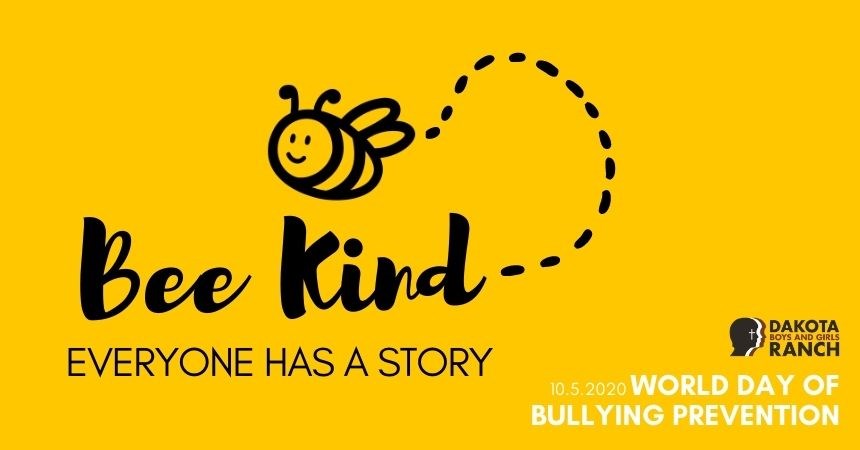Join Dakota Boys and Girls Ranch in taking a stand against bullying
On October 5, World Day of Bullying Prevention, and throughout the month, Dakota Boys and Girls Ranch staff and kids are holding awareness and learning activities to help wipe out intentional, repeated, and degrading meanness.
“Bullying leaves people feeling small and exposed and so lonely,” said Joy Ryan, President/CEO, Dakota Boys and Girls Ranch. “I was bullied in school, and unfortunately, I am in the majority. We did a quick survey of the children in our care right now and 88 percent of them report having been bullied. Bullying doesn't build character or compassion and there is no lesson to be learned from experiencing it. Social media has added another avenue for bullying at a whole new level and made it mainstream.”
The effects of bullying can be long-lasting for victims including fear and anxiety, depression and thoughts of suicide. April Morris, a therapist at Dakota Family Services (an outpatient mental health clinic founded by Dakota Boys and Girls Ranch), says bullying can also have long-term effects on the bullies themselves.
According to stompoutbullying.org:
- 1 out of 5 kids are bullied
- 32% of students say they have been digitally harassed
- 5.4 million students skip school at some point in the year due to bullying
- Child and teen Bullying and Cyberbullying are both a growing problem.
- Some kids are so tormented that suicide has become an alternative for them. However, most suicides are not just a result of bullying. There are usually other factors involved.
- It can mess up a kid's future. Bullies are more likely to skip school, drop out of school, smoke, drink alcohol, get into fights and be arrested at some point in their life. 60% of boys who were bullies in middle school had at least one criminal conviction by the age of 24.
Morris encourages parents to consider several things when determining if their child is a victim of bullying. Is your child refusing to go to school? Are they afraid to ride the bus? Are they getting stomachaches and headaches? Do you see any changes in their eating and sleeping habits, changes in grades, or changes in their behavior? Any of these things can be signs your child is being bullied.
What to do if your child is being bullied
“When you’ve identified that your child is being bullied, the first thing you’ll want to do is march in and take care of it,” Morris says. “Unless there is a threat of physical violence, you might want to refrain a minute. What you really want is for your child to know they are being heard and to learn how to handle the situation themselves. Talk with them and encourage them. What do you think you could do? What are your options? What could you do next?”
Explain to your child that the bully wins when they get angry and upset. The bully is looking for a reaction and often loses interest if they don’t get one. Find more ideas for helping your child deal with bullies at www.stompoutbullying.org/how-to-deal-with-bullies.
If your child can’t manage the situation themselves, contact a teacher, school counselor, or principal at your school and share your concerns. Work closely with the school to solve the problem.
When your child is bullying others
If you are concerned your child might be bullying others, notice any changes in their behavior or attitude. Morris said, “Is your child aggressive towards others? Do they feel a need for control? Are they getting into frequent fights at school? Are you noticing they don’t take responsibility for their actions? These are all signs they may be engaging in bullying.”
Morris says the most important action you can take to prevent your child from bullying is to spend quality time with them and let them know they have your love and attention.
“Kids act out when there is an unmet need. Sometimes it’s a lack of communication skills or an inability to express what they need.”
Cyberbullying
The COVID-19 pandemic has led to kids and teens increasing their use of digital platforms, smart phones, and social media—leading to an increase in cyberbullying.
If your child is being bullied online, tell them to never respond, and encourage them to tell you if they are being bullied, harassed, or stalked online. Block all communications from the bully and save any evidence of the cyberbullying. Talk to your children about appropriate online behavior, keep your computer in an open area in your home, and monitor your child’s computer.
If your child is the victim of bullying, or is engaging in bullying behavior, consider making an appointment with a therapist at Dakota Family Services, the outpatient mental health clinic founded by Dakota Boys and Girls Ranch. Call 1-800-201-6495 to schedule an appointment with a provider in Bismarck, Fargo, or Minot, ND.

